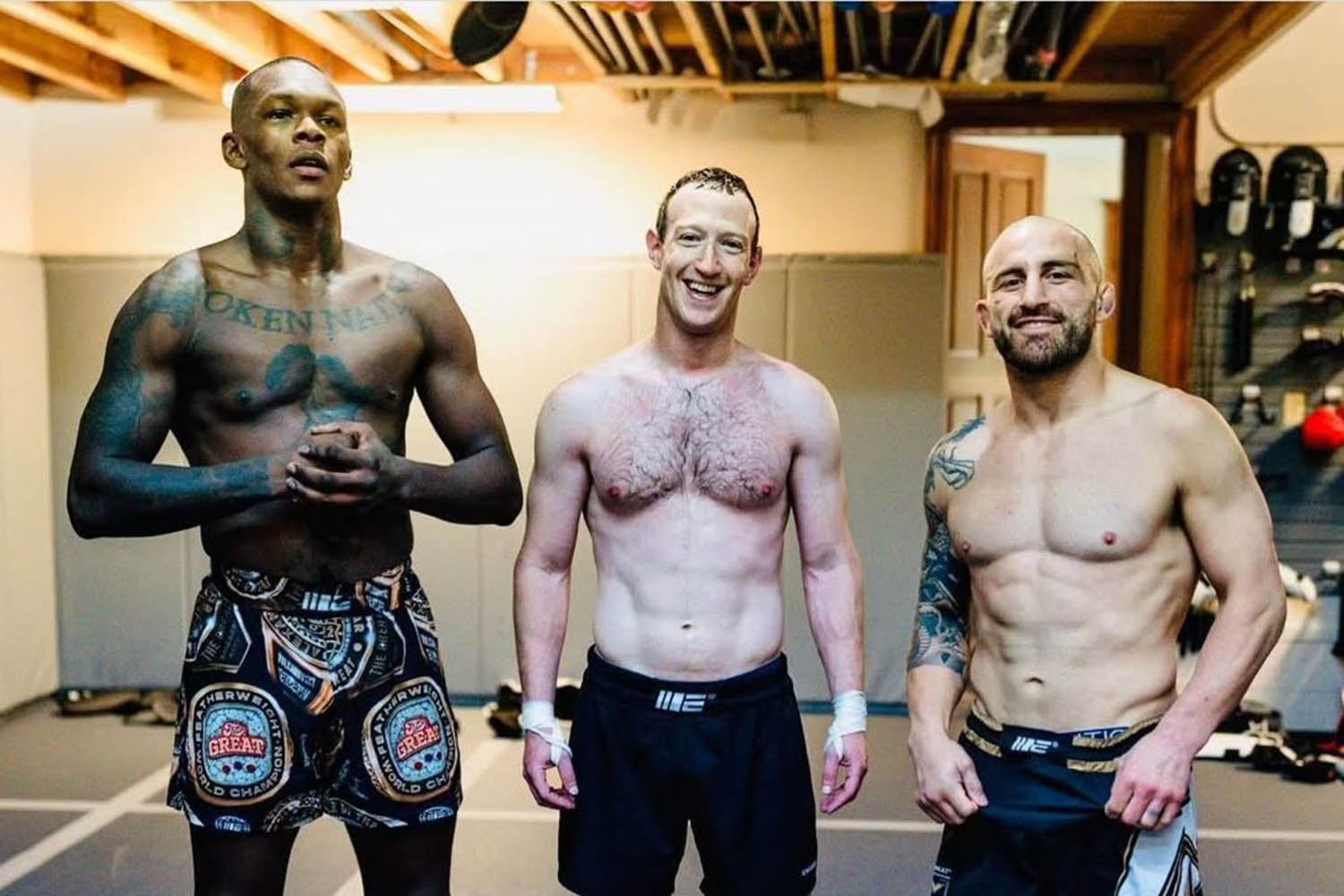Dearly beloved, our reading for today is a sermon by the supreme leader of Meta (nee Facebook), Mark Zuckerberg (hereinafter known as Zuck), given on the 30th day of July in the year of our Lord 2025. For those who have been holidaying on Mars, Zuck, who in an earlier life was a socially challenged nerd, has now been reborn as a believer in the importance of “masculinity” and as a mixed martial arts fighter. So devoted to this latter activity is he that he has even posed topless with “legendary fighters Israel Adesanya and Alex Volkanovski” (pictured).
And now he wishes to enthuse us on the newest new thing: artificial general intelligence.
The subject of his sermon is “personal superintelligence”. It runs to 625 words and is available online on the Meta site, where readers with robust constitutions may peruse it, having made sure that a sick bag is readily to hand. Its basic message is this: superintelligence is coming and it will be mighty, but fear not, little people, for my great corporation will put this power into your own tiny hands so that you may flourish.
“Superintelligence,” he burbles, “has the potential to begin a new era of personal empowerment where people will have greater agency to improve the world in the directions they choose.” But, he goes on, “an even more meaningful impact on our lives will likely come from everyone having a personal superintelligence that helps you achieve your goals, create what you want to see in the world, experience any adventure, be a better friend to those you care about, and grow to become the person you aspire to be”.
And, of course, Meta has a vision: “to bring personal superintelligence to everyone. We believe in putting this power in people’s hands to direct it towards what they value in their own lives”.
But unlike some nasty “others in the industry” who believe superintelligence “should be directed centrally towards automating all valuable work”, leaving “humanity to live on the dole of its output, at Meta”, says Zuck, “we believe that people pursuing their individual aspirations is how we have always made progress expanding prosperity, science, health and culture.”
Newsletters
Choose the newsletters you want to receive
View more
For information about how The Observer protects your data, read our Privacy Policy
Aw-shucks. As a sermon, it’s somewhere between a rejected Ted Talks script and a hack self-help manual. But the subliminal message is clear: Zuck wants Meta to be the intermediary for all human-AI interaction, positioning itself as the essential infrastructure for the AI age. This isn’t about empowering individuals; it’s actually about ensuring Meta’s relevance and profitability in a post-smartphone, AI-dominated world.
In that context, the timing of the present screed is interesting. As tech writer and investor Om Malik pointed out in an astute analysis, this is the fifth sermon Zuck has given since 2012. Each one coincided with a crisis for his company. In 2012, it was the need to urgently pivot from the PC to mobile phones. In 2017, it was the backlash after the revelations (in The Observer) about Cambridge Analytica and the role that Facebook had played in Donald Trump’s election. In 2019, the sermon was in response to concerns about messaging and privacy. In 2021, it was triggered by hysteria about the metaverse (after which Zuck blew more than $70bn, to little obvious effect.)
So what’s brought him to the pulpit this time? Simple: it’s AI. Like most of the industry, Meta was discombobulated by the arrival of ChatGPT and to some extent it’s still playing catch-up. This year, it plans to spend between $60bn and $65bn on AI-related capital expenditure, but that leaves it trailing behind Amazon, Microsoft and Alphabet/Google. And Zuck’s frantic race to lure AI talent from other companies that I wrote about two weeks ago also suggests insecurity on the people front.
So in the AI arms race that’s under way, Meta seems under threat. The big question is: what place will it occupy in this emerging new marketplace? Zuck’s sermon outlines what he sees as the answer – to exploit the only asset that he has that his competitors lack: the attention of billions of Facebook, Instagram and WhatsApp users across the world.
“We have the resources and the expertise to build the massive infrastructure required,” he concludes, “and the capability and will to deliver new technology to billions of people across our products. I’m excited to focus Meta’s efforts towards building this future.”
I’m sure he is. But then he felt that about the metaverse back in the day. So let us pray that he eventually grows to become the person he aspires to be. Amen.
What I’m reading
Left leaning
Why I Am a Liberal is an interesting New York Times opinion piece by great US legal scholar Cass Sunstein.
Blotting his copybook
Andrew Sullivan gives an eloquent account of the damage Donald Trump is doing to American society in his Substack essay The Permanent Stain.
Silicon implant
Marking the Government’s Homework on Public Sector AI is Helen Beetham’s characteristically acute Substack analysis of the UK government’s infatuation with Silicon Valley.
Photograph by @stylebender/Instagram

